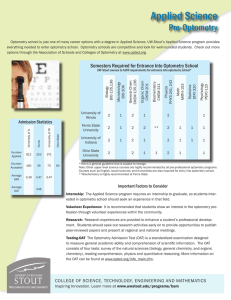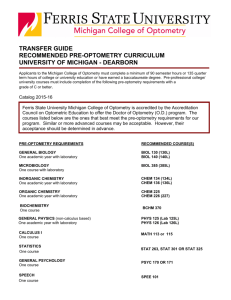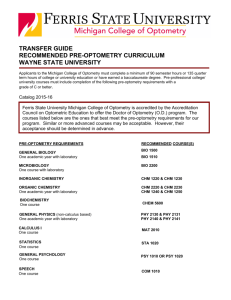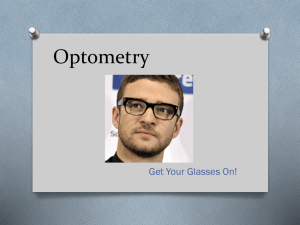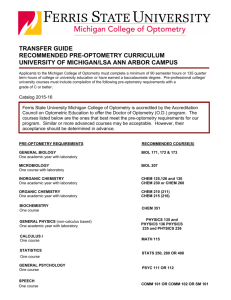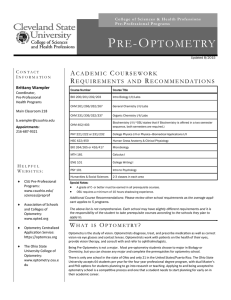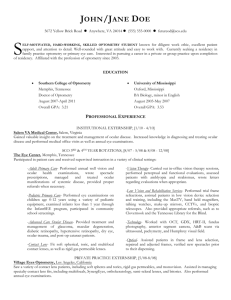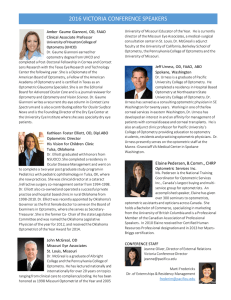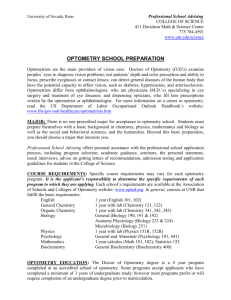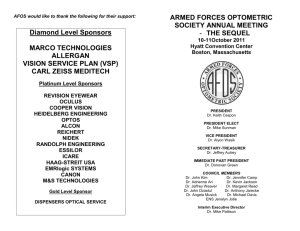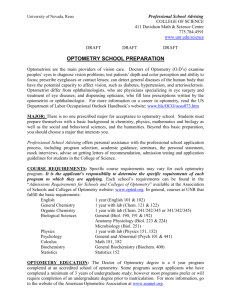Can someone answer my questions? - University of Missouri
advertisement
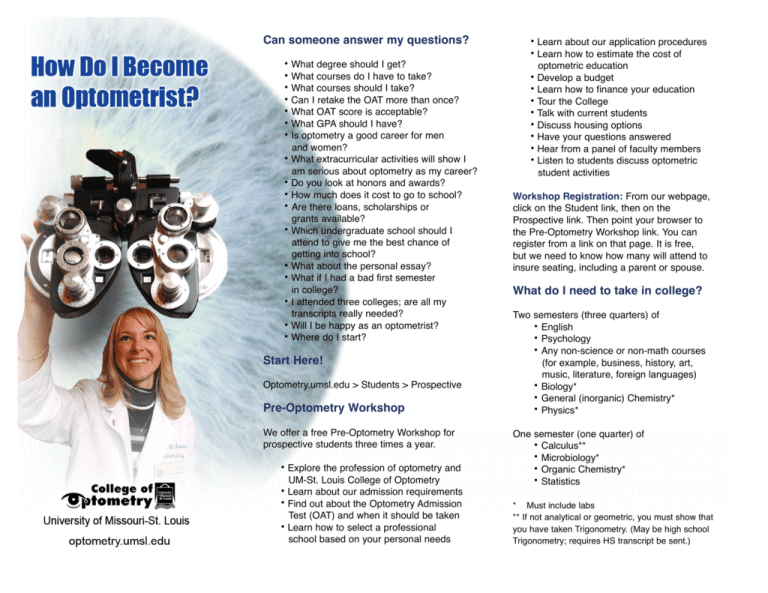
Can someone answer my questions? • What degree should I get? • What courses do I have to take? • What courses should I take? • Can I retake the OAT more than once? • What OAT score is acceptable? • What GPA should I have? • Is optometry a good career for men and women? • What extracurricular activities will show I am serious about optometry as my career? • Do you look at honors and awards? • How much does it cost to go to school? • Are there loans, scholarships or grants available? • Which undergraduate school should I • • • • • attend to give me the best chance of getting into school? What about the personal essay? What if I had a bad first semester in college? I attended three colleges; are all my transcripts really needed? Will I be happy as an optometrist? Where do I start? Start Here! Optometry.umsl.edu > Students > Prospective Pre-Optometry Workshop We offer a free Pre-Optometry Workshop for prospective students three times a year. • Explore the profession of optometry and UM-St. Louis College of Optometry • Learn about our admission requirements • Find out about the Optometry Admission Test (OAT) and when it should be taken • Learn how to select a professional school based on your personal needs • Learn about our application procedures • Learn how to estimate the cost of optometric education • Develop a budget • Learn how to finance your education • Tour the College • Talk with current students • Discuss housing options • Have your questions answered • Hear from a panel of faculty members • Listen to students discuss optometric student activities Workshop Registration: From our webpage, click on the Student link, then on the Prospective link. Then point your browser to the Pre-Optometry Workshop link. You can register from a link on that page. It is free, but we need to know how many will attend to insure seating, including a parent or spouse. What do I need to take in college? Two semesters (three quarters) of • English • Psychology • Any non-science or non-math courses (for example, business, history, art, music, literature, foreign languages) • Biology* • General (inorganic) Chemistry* • Physics* One semester (one quarter) of • Calculus** • Microbiology* • Organic Chemistry* • Statistics * Must include labs ** If not analytical or geometric, you must show that you have taken Trigonometry. (May be high school Trigonometry; requires HS transcript be sent.) Now that you know what you must take, also note that the Optometric Admission Test (OAT) will test two semesters of Organic Chemistry. It will not test Microbiology or Calculus. What else can I do? • Undergraduate research • Work in an OD's office for a summer or two We recommend strongly that you consider Biochemistry, Anatomy, Physiology, and Cell Biology at a minimum, in addition to the courses listed above. All transcripts of all schools will be needed when you apply. What about the OAT? (Optometric Admission Test) We strongly encourage you to go to www.opted.org to identify the areas included in the OAT testing. Be sure that you have taken the appropriate coursework covering these areas prior to sitting for the exam. Is there something I can do to make me stand out? • Take all college pre-requisite courses, insure you are on-track for a (any) bachelor's degree, and that your cumulative GPA is above 3.3 • Score 320 or higher on all sections of the OAT • Shadow one, two or three different optometrists, including your own O.D. • Ask questions to learn about the practice of optometry. For suggestions, see “A Successful Applicant” on our Collegeʼs prospective student page. • Do some community service (or sports, or both), and demonstrate your leadership ability • Use your essay to address Self-employed optometrists, including those in individual, partnerships, and group practice, continue to earn higher income than those in other settings. Earnings also vary by group size.… practitioners in mid-sized groups—three to five people—earn $179,205.” areas needing more explanation Kiplinger's Top 13 Careers How do I apply? • The centralized application is at www.optomcas.org. Have a copy of your unofficial transcripts as well as any honors and awards you have achieved and the email addresses of your references • UMSL's supplemental application is at http://optometry.umsl.edu Application deadline • Merit Scholarship Deadline Jan 5th • Final Application Deadline Feb 15th Are there scholarships or loans available for school? Federal financial aid through the FAFSA (www.fafsa.ed.gov) covers at least your fees while in school. Merit Scholarships are offered based on GPA and OAT section scores. Kiplinger ranks optometry among top professions that promise income growth, work-life balance and social impact over the next decade (Nemko, Marty, Kiplinger, “13 Careers for the Next Decade,” January 2010.) Careers in optometry offer “a high patient success rate [and] good income . . . Speak with, or better yet, visit people who work in that field to get a genuine sense of what it's like,” suggests Nemko. Career Outlook? The U.S. Bureau of Labor Statistics predicts that the need for optometrists will increase 24% from 2008 to 2018. Websites to help you learn about the profession . . . • • • • www.aoa.org www.opted.org www.theaosa.org www.optometry.umsl.edu What does an optometrist earn? From the U.S. Bureau of Labor Statistics… “Median annual wages of salaried optometrists were $96,320 in May 2008. The middle 50 percent earned between $70,140 and $125,460. Median annual wages of salaried optometrists in offices of optometrists were $92,670.… According to the American Optometric Association, average annual income for selfemployed optometrists was $175,329 in 2007.… If becoming a Doctor of Optometry interests you, please contact us. College of Optometry University of Missouri-St. Louis One University Blvd St. Louis, MO 63121 888-EYE-UMSL optometry@umsl.edu Optometry.umsl.edu > Students > Prospective
